The ‘Building Alliance for Local Advancement, Development and Investment’ (BALADI) program, funded by USAID and implemented by Rene Moawad Foundation (RMF), announced the launch of 32 new municipal-led local development projects that will receive financial support from the agency.
The projects were selected following the BALADI program’s third call for funding municipal development projects in July 2017. This initiative will pave the way for a greater number of municipalities to submit projects that respond to their community needs.
The event launch, which took place at ‘Le Gray’ Hotel in Beirut, was attended by USAID Mission Director Dr. Anne Patterson, René Moawad Foundation Executive Director Michel Moawad, BALADI Program’s project director Mrs Natasha Marchelian Saade, as well as representatives from municipalities across Lebanon.
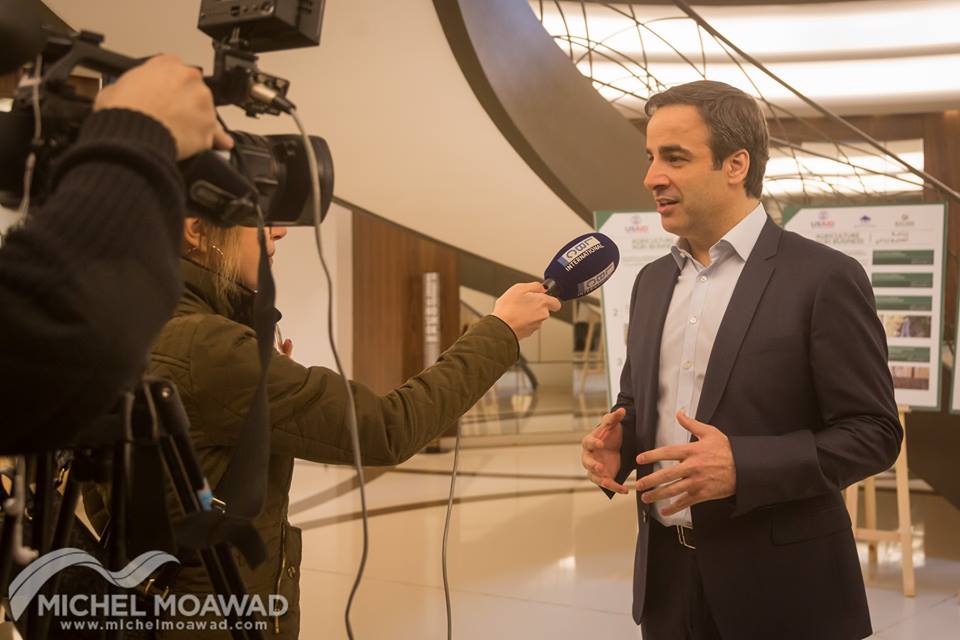
Moawad
In his address at the event, Moawad said: “Since its launching in 2012, the BALADI program, has proved that it is filling an urgent municipal development need for municipalities struggling with limitations in financial and human resources. BALADI provides a needed support to help the municipalities enhance their capacities, and offer vital opportunities and quality services for the citizens and residents of their local communities.”
“This program comes as an answer to a major national development need, as the country’s central Government proves, in a clearer and clearer way, as time passes by, its incapacity to implement efficient and transparent development policies, or to provide basic needs for towns and rural villages far from the capital, or to answer the citizens’ needs that would allow them to remain in their land and preserve their dignity.
“When I speak about the program’s crucial importance, I am not just throwing out words of praise; I mean that we can understand the scale of accomplishments made when we look at the figures and achievements… Following the great success that the first two rounds of projects had enjoyed, RMF received applications from 125 municipalities for the third round. This represents 14% of municipalities in Lebanon!
“What do these figures show? First, they reveal the need for these projects. Second, that the first two rounds were a real success. Third, and I say it with humbleness, they demonstrate the successful way in which RMF has worked to implement these projects using the generous funds provided by USAID and the American people, notably the positive element of collaboration with the municipalities and local Civil Society Organizations.”
Moawad shared that due to the higher than expected number of municipalities applying for projects, RMF asked USAID to increase the allocated budget in order to accommodate the largest possible number of projects. He added: “I thank USAID and the American people for responding positively to this request, and to also extend the periods of execution. This will allow us to implement 32 new projects instead of just 16 projects. By July 2019, 121,000 persons would have benefitted from these projects, which spread across 11 Cazas in Lebanon: Akkar, Hasbaya, Zgharta-Zawiyat, Koura, Batroun, Zahle, Baalbek, Baabda, Aley, Chouf and Jezzine…”
He continued: “With these 32 new projects, the BALADI program would have executed 87 projects throughout Lebanon since 2012, with the cooperation of 155 municipalities. Out of these 87 projects, RMF handled and executed 63 projects, which represent 72% of BALADI’s total projects. This confirms the successful way in which RMF and its implementing team have worked. I take the opportunity to wholeheartedly thank all the members of the RMF team, while noting with appreciation CARITAS Liban’s role in implemented the remaining 25 projects.”
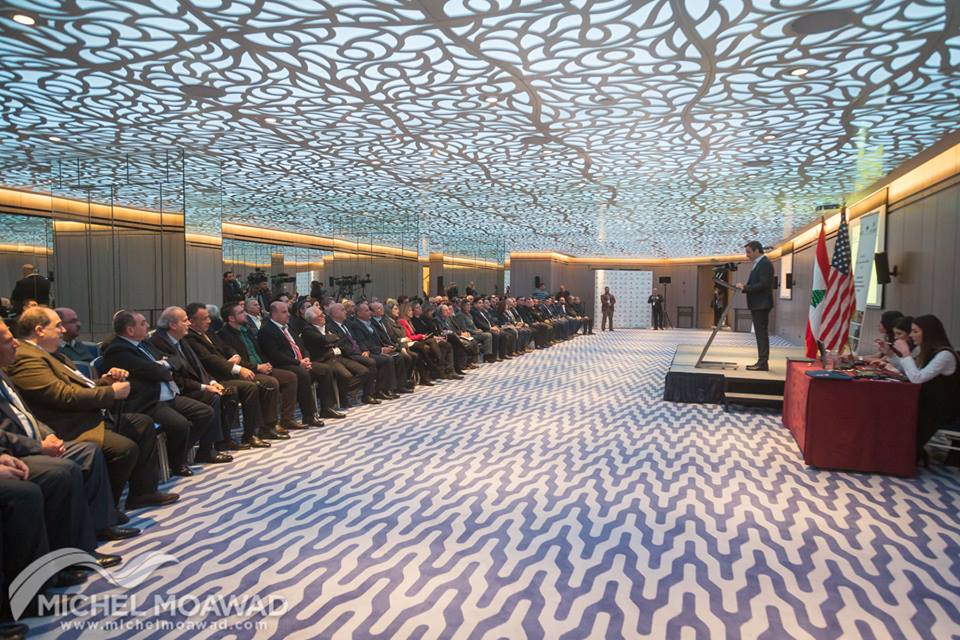
Moawad emphasized that the municipalities’ rush to apply for BALADI funded projects, proves that throughout Lebanon, municipalities are in a big need for development, and shows, yet again, that the centralized administration system in the country has failed, and that the numerous development problems cannot be anymore solved but by switching to a fully decentralized system. He added: “The BALADI program’s set-up has provided a model of cooperation between 3 parties: The international granting organisations – represented in this program by USAID -, local NGOs – in this case RMF – who offer their professional experience and capacities to implement the projects in an efficient way, and local authorities – municipalities – who play a vital role, as they know more than any other entity the development needs in their areas. This tripartite set up and cooperation has proven to be a full success and leads to best results. Therefore, it needs to be replicated, generalised, maximized, and applied in the largest possible number of projects.”
Based on the success of this leading development experience that helped change the lives of a large number of Lebanese citizens around the country, without any preferences or discrimination, Moawad repeated once more his thanks to the American people for the funding they provided for BALADI through USAID, and to the municipalities for their wonderful cooperation. Addressing the municipalities who were not selected this time around, Moawad promised to keep working hand-in-hand with them, as has always been the case, and encouraged them to keep trying to apply for projects and funds, to relieve a portion of the needs and deprivation in the town and villages of their geographical areas. He also thanked RMF’s team for their efforts and asked them to “be ready for more, in order to ensure a successful outcome for the 32 new projects, and meet the expectations and responsibilities that our name and reputation impose on us henceforth.”
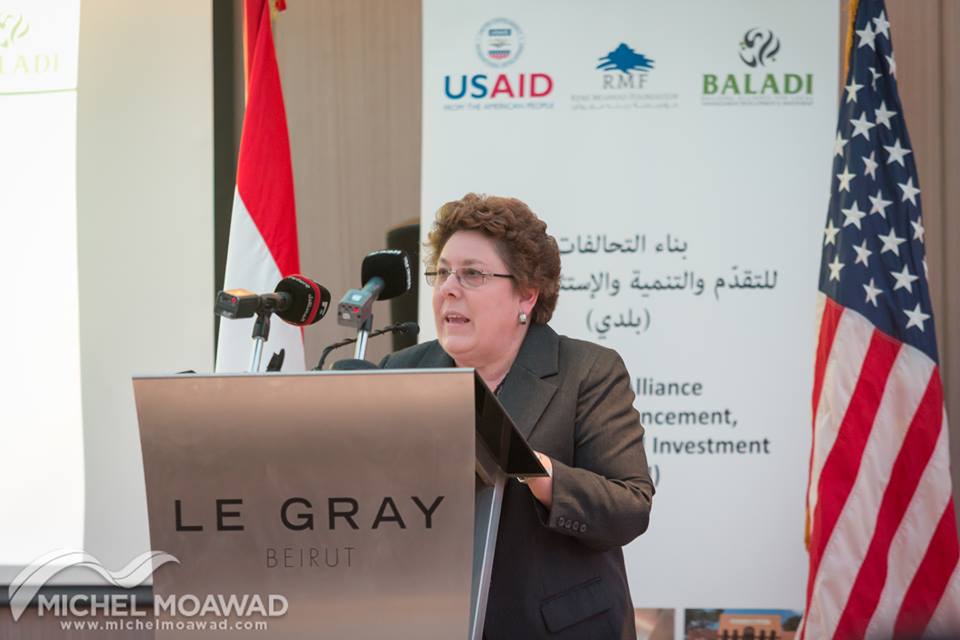
Patterson
USAID Mission Director Dr. Anne Patterson, then spoke. She started by saying how proud she was for attending the event launch for 32 new municipal-led local development projects, part of BALADI’s 3rd round of projects “that will receive funding from the American people”. Patterson noted that this 3rd round of projects “was of a crucial importance for building flexible and inclusive local communities.” “BALADI was established,” she said, “not only to provide financial support and the funding for projects, but the goal of the program was more to encourage the participation of local communities, because today the citizens want to participate more in matters that shape their future.”
She added that the participation of local communities was from the beginning essential for BALADI, and that the results are self-explanatory, as “the 55 projects that have been implemented, or are on the way to being completed, have created jobs, and have enhanced, in the local citizens, the feeling of pride towards their towns and villages. The projects have benefited and improved the lives of 195,000 persons.”
Patterson expressed her happiness that the program has now been able to provide support for a larger number of municipalities, “because USAID is convinced, today more than at any previous time, that the municipalities should deepen their involvement in their local communities, which would allow the two parties to work hand-in-hand and realize higher achievements.”
She also announced that USAID will be providing more than 3 Million USD worth of infrastructure, material, equipment, technical support and trainings during the implementation of the new projects, which will help alleviate the economic and social burdens that the local communities are facing. Patterson praised the municipalities for the efforts they put forth to overcome the various obstacles, and for the cooperation they displayed while setting in place the numerous activities that improved the beneficiaries’ personal standard of living. “Joined efforts,” she said, “help improve the local economy, and help enhance its prosperity and stability.”
Patterson concluded by thanking the BALADI and RMF teams, along with the other partners, like CARITAS Liban, who have been working tirelessly to allow the program to reach optimal results.
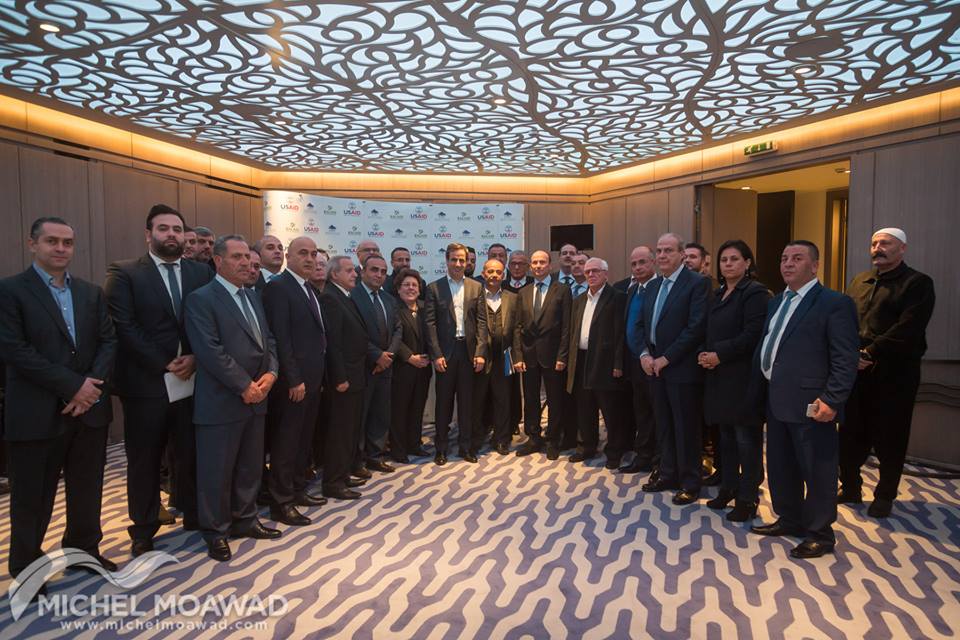
The new projects
BALADI Program project director Mrs Natasha Marchelian Saade then announced the 32 new municipal-led local development projects for which BALADI will provide support based on detailed technical specifications. The projects cover the following sectors that meet priority community needs: Solar water heating, access to better health services, income generation projects, public education, backup-electricity generation, and the utilization of solar power to provide efficient street lighting. The projects will engage 32 municipalities and 18 local NGOs across Lebanon. The 32 USAID-funded activities are expected to improve the lives of more than 121,000 persons by the end of the BALADI program in 2019.
The selected municipalities
- Caza of Akkar: Mashha, Bzeil, Akkar Al Atika, Beino-Kboula, Al Amayer, Al Noura, Debbabiye.
- Caza of Zgharta: Kfardlakos, Rachiine, Aintourine.
- Caza of Koura: Fih, Zakroun, Kefraya.
- Caza of Batroun: Jran, Mehmarsh, Beit Chlala, Assia.
- Caza of Baabda: Wadi Chahrour Al Olya.
- Caza of Aley: Aley.
- Caza of Chouf: Mazraat El Chouf.
- Caza of Jezzine: Bkasiine, Lebaa, Mashmoushe, Kattine-Hidab.
- Caza of Baalbeck: Arsal, Ras Baalbeck, Talya.
- Caza of Zahle: Ferzol, Qaa El Rim, Kusaya.
- Caza of Hasbaya: Shwayya, Fardis
As the official event ended, Moawad, Patterson and the mayors of the selected municipalities moved to the hotel’s ‘Wall of Fame’ for a group souvenir photo, followed by a cocktail reception. The attendants also visited the exhibition that was put together, about the first two rounds of BALADI projects already implemented.
About BALADI
The BALADI program is also providing assistance for municipalities to implement needed community development activities, especially those that are most responsive to Lebanese host community needs. This support will improve the capability of municipalities to work inclusively with citizens and accomplish local development activities and public service delivery. With this announcement, BALADI will be supporting a total of 87 projects in 23 districts in Lebanon while engaging more than 152 municipalities.
For more information about the BALADI Program, please visit:
baladi-lebanon.org






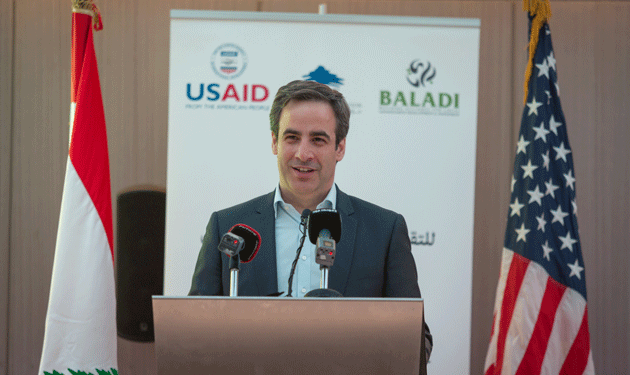
 العربية
العربية